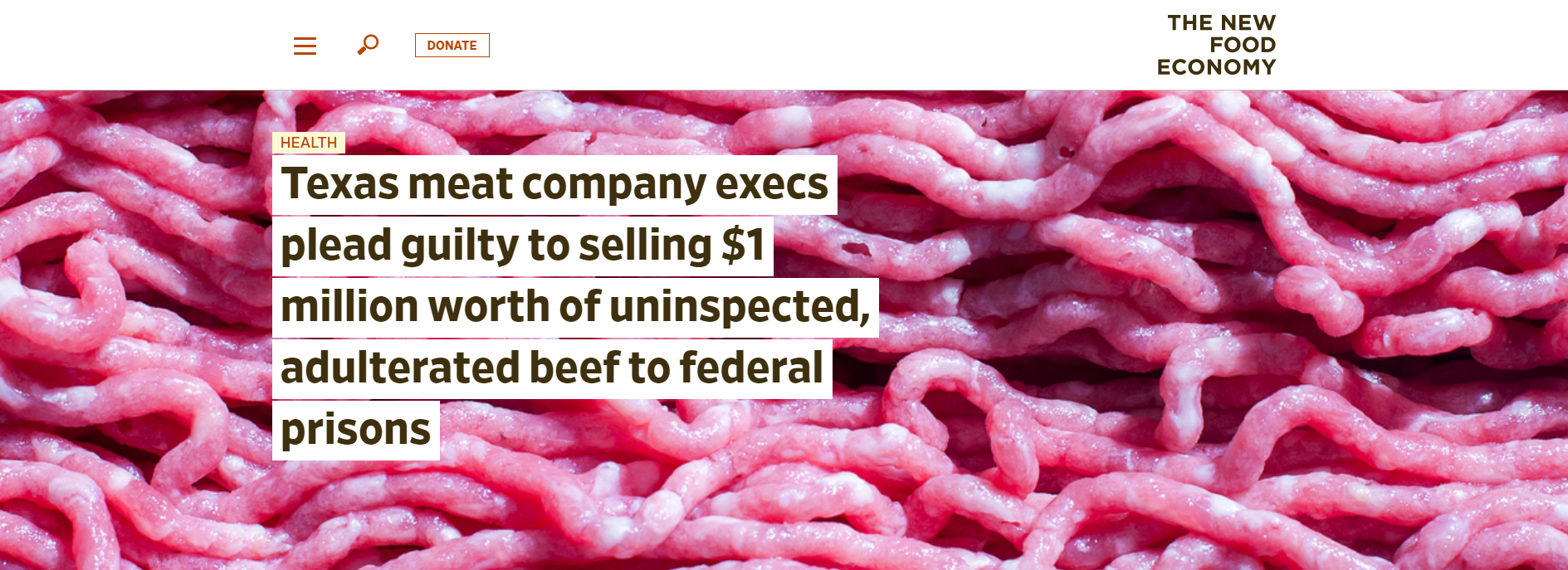Texas meat company execs plead guilty to selling $1 million worth of uninspected, adulterated beef to federal prisons

Two executives of a now-defunct meatpacking company pleaded guilty to selling more than $1 million dollars worth of adulterated and uninspected beef to the federal prison system, the Department of Justice announced this week.
Jeffrey Neal Smith and Derrick Martinez, president and operations manager of West Texas Provisions, respectively, admitted to contaminating and mislabeling approximately 775,000 pounds of meat that were then distributed to 32 prisons in 18 states. Specifically, Smith and Martinez sold products that they falsely claimed had been inspected by the Department of Agriculture’s (USDA) Food Safety and Inspection Service (FSIS) between October 2016 and August 2017. They also cut ground beef with whole cow hearts, thereby violating USDA food standards.
Though this is one individual case, it falls within a broad spectrum of issues relating to food safety in the prison system.
Smith and Martinez apparently went to great and, sometimes, bizarre lengths to obscure their scheme. Federal law requires all slaughterhouses to undergo FSIS inspection. To that end, after meatpacking facilities report their hours of operation to the agency, they are prohibited from working outside those hours.
According to former employees, Smith and Martinez ordered workers to come in on nights and weekends and process meat without inspectors present. To avoid arousing suspicion, workers were instructed to park off-site and work with the lights off, according to court documents. They were also discouraged from leaving the building to take meal breaks, in order to keep activity around the facility to a minimum. Additionally, Smith and Martinez admitted to hiding uninspected meat in freezers, and distracting inspectors from noticing said meat.
Federal inspectors are responsible for making sure that meat products are free from disease, and verifying that processors meet food safety standards. Skip that process and, well, an eater has virtually no idea what is being consumed.
The issue of heart-mixing is a bit more complicated. In February 2017, there was a cacophony of confusion about USDA’s rules regarding the inclusion of cow hearts as an ingredient in ground beef. Technically, heart meat—officially defined as “cardiac muscle trimmed from the ventricular wall of a beef heart”—has always been allowed in ground beef. But the rest of the cow heart, including vessels, fat, and various chambers, are considered byproducts that can not be used. Nonetheless, Smith and Martinez admitted to keeping whole hearts off-site, then bringing them in after hours to process into what they later sold as ground beef.
Workers were instructed to park off-site and work with the lights off, according to court documents.
Though this is one individual case, it falls within a broad spectrum of issues relating to food safety in the prison system. In 2014, another Texas meat processor paid nearly $392,000 as part of a settlement with the USDA for mislabeling beef meant for pet food, which was then sold to the Bureau of Prisons. In Arizona, former inmates say they were served chicken from boxes labeled “not for human consumption.” Last year, The New Food Economy reported on the hidden public health crisis in America’s prisons—where incarcerated people were more than six times as likely to get a foodborne illness than the general population.
There are often economic incentives for food service providers to turn a blind eye to quality, such as the right to pocket any money leftover after fulfilling a contract. Infamously, an Alabama prison sheriff bought a beach house partially using “excess” funds meant to feed inmates. Smith and Martinez were also likely financially motivated to shirk federal beef standards.
Attorneys for the executives did not respond to requests for comment. Both defendants are scheduled to be sentenced on February 13, 2020.
